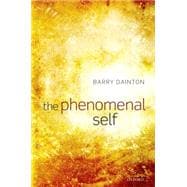
Note: Supplemental materials are not guaranteed with Rental or Used book purchases.
Purchase Benefits
What is included with this book?
| List of Figures | p. viii |
| Preface | p. xi |
| Acknowledgements | p. xxvi |
| Mind and Self | p. 1 |
| Can it be so easy? | p. 1 |
| Psychological continuity | p. 6 |
| First doubts | p. 11 |
| Some varieties of virtual life | p. 14 |
| Strands untangled | p. 21 |
| Phenomenal Unity | p. 28 |
| Experience | p. 28 |
| Phenomenal space | p. 34 |
| Self and awareness | p. 39 |
| A superfluous self | p. 42 |
| Simplicity and unity | p. 46 |
| Phenomenal Continuity | p. 51 |
| A constraint | p. 51 |
| Memory | p. 53 |
| Chunks, apprehensions and representations | p. 56 |
| Overlap and flow | p. 63 |
| Phenomenal cuts | p. 68 |
| The one experience view | p. 71 |
| Streamal unity | p. 73 |
| Powers and Subjects | p. 75 |
| Bridge building | p. 75 |
| Experience-machines and beyond | p. 81 |
| Power structures | p. 88 |
| The C-theory | p. 111 |
| Powers in general | p. 114 |
| Projection and production | p. 131 |
| Alternatives | p. 135 |
| The self in experience | p. 135 |
| Bridges of resemblance | p. 148 |
| Fundamentalism | p. 151 |
| Foster's modal bridge | p. 153 |
| Unger's material bridge | p. 161 |
| Minds and Mental Integration | p. 170 |
| From C-systems to minds | p. 170 |
| Aspects of mind | p. 171 |
| Psycho-phenomenal integration | p. 175 |
| C-relations and P-relations | p. 178 |
| From a functional perspective | p. 181 |
| Non-phenomenal selves | p. 188 |
| What matters | p. 192 |
| Embodiment | p. 201 |
| A blurring | p. 201 |
| Four grades of embodiment | p. 203 |
| Phenomenal embodiment | p. 206 |
| Effective embodiment | p. 209 |
| Boundary disputes | p. 215 |
| Monist alternatives | p. 224 |
| Minimalism and possession | p. 227 |
| Simple Selves | p. 236 |
| Simplicity and isolation | p. 236 |
| Isolation: strands of a defence | p. 238 |
| Reductio? | p. 245 |
| Minimal subjects | p. 249 |
| A minimal modification, and a moral | p. 251 |
| Weak unity | p. 254 |
| Holism | p. 264 |
| Unity and interdependence | p. 264 |
| Interdependent potentials | p. 266 |
| Phenomenal interdependence | p. 272 |
| Organization and interference | p. 273 |
| C-holism | p. 277 |
| From C-holism to power holism | p. 289 |
| Power systematicity | p. 300 |
| Simplicity | p. 307 |
| Modes of Incapacitation | p. 311 |
| Absoluteness | p. 311 |
| Some varieties of incapacitation | p. 313 |
| Brains | p. 316 |
| Cyclical subjects | p. 319 |
| Congenial decomposition | p. 321 |
| Assessments | p. 325 |
| Deviancy | p. 331 |
| Teleportation revisited | p. 336 |
| From Egos to C-systems | p. 338 |
| Objections and Replies | p. 341 |
| Ontological qualms | p. 341 |
| Issues of substance | p. 342 |
| Unity and independence | p. 344 |
| Menacing circularities | p. 348 |
| Ownership, isolation and holism | p. 354 |
| Power worlds | p. 359 |
| The Topology of the Self | p. 364 |
| Fission | p. 364 |
| Fission as fatal | p. 368 |
| Can consciousness divide? | p. 370 |
| Overlap to the rescue? | p. 373 |
| Time travel and double existence | p. 378 |
| Personal and phenomenal time | p. 381 |
| Non-linearity | p. 385 |
| Time and times | p. 389 |
| Issues and objections | p. 393 |
| Fusion | p. 400 |
| The many shapes of life | p. 406 |
| Appendix: Reductionism | p. 409 |
| Bibliography | p. 418 |
| Index | p. 427 |
| Table of Contents provided by Ingram. All Rights Reserved. |
The New copy of this book will include any supplemental materials advertised. Please check the title of the book to determine if it should include any access cards, study guides, lab manuals, CDs, etc.
The Used, Rental and eBook copies of this book are not guaranteed to include any supplemental materials. Typically, only the book itself is included. This is true even if the title states it includes any access cards, study guides, lab manuals, CDs, etc.